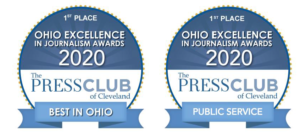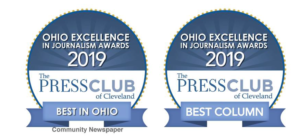I have been writing articles for the Heights Observer, covering the meetings of the Cleveland Heights Charter Review Commission (CRC). Like other local residents who writer articles for the Observer, I am a volunteer. I also volunteer for the FutureHeights organization.
Unlike some reporters, I have also expressed an opinion on a key issue that is being debated in the meetings I am covering. That issue is whether Cleveland Heights should have a popularly elected full-time mayor, rather than the current seven part-time city council members who appoint a full-time city manager.
I have expressed support for this change to an elected mayor. I have remained undecided, however, on the other major governance issue facing the CRC. That issue is whether the current at-large members of city council should include some members elected by ward or district.
A few people have questioned how I can do both – writing objective articles on the meetings of the CRC and expressing an opinion on one of the key issues facing the group.
Because I have stated my position publicly, I am doubly careful to avoid letting my opinion color the articles in any way. After each meeting of the CRC, I review my notes, consult the online video, and then work hard to write what I consider to be a fair and objective summary of the meeting. For example, when a particular issue has been debated at the meeting, I am careful to give both sides of an argument equal coverage in the article.
Considering this issue of journalistic objectivity more broadly, I realize that journalists are human beings who are engaged in the world around them and often have personal views on the subjects that they cover in news articles that they write. That is inevitable.
Journalists who write news articles typically do not share their personal views publicly. In this instance, I have shared my personal views publicly, which, in one sense, alerts readers to look for any bias in my articles. I think that this is a good thing.
Prior to the creation of the CRC, I was part of a small group of Cleveland Heights residents who were considering a petition drive to place key changes in our local government on the ballot.
When the city decided to form the CRC, I and three other members of our group wrote a letter to the city council saying that, out of consideration for the city’s decision to form a CRC, we had decided to drop our participation in a petition process. Three of us then applied to for membership on the CRC.
None of the three of us was selected to be members of the CRC. City council, particularly its leadership group, made it clear that members of the CRC should be citizens who did not have a pre-conceived position on any of the major charter amendment issues.
Although that policy seems understandable, I believe that citizens who have been civically engaged in Cleveland Heights are likely to have formed opinions on many local issues.
Because a charter review group should include many citizens who have been civically engaged, I believe that a more appropriate criterion for membership would be whether potential members could show that they would be open-minded on the issues and could remain open to changing any pre-conceived positions during the course of the CRC process.
Just because a citizen hadn’t spoken publicly on these issues doesn’t mean that he or she had no pre-conceived notions. In fact, in attending the CRC meetings, I have sensed that a number of members came into the process believing that the current council-manager system should remain in place unless convincing evidence was presented to the contrary.
That is fine, but it seems – and I may be wrong – that only two of the 15 CRC members came into the process with pre-conceived support for change.
Personally, I supported the current council-manager form of government until a few years ago, when I retired from full-time work as a city planner in Cleveland, and started to get engaged in my home community of Cleveland Heights.
What got me thinking about the need for a bolder, more decisive, more agile form of government – which I believe is more likely to come from a government led by a popularly elected full-time mayor – was the way the city handled or failed to handle the bankruptcy and partial collapse of Severance Center.
I was one of a group of people who urged the city to step in while the property was in receivership and put a plan on the table with a package of possible incentives for a developer interested in the kind of transformation that I believe Severance needs if it is to become an asset for the community.
When the city failed to take this kind of action and sat back to let the private market take its course, what I and others predicted did, in fact, come to pass, as the property was purchased by an owner known to buy distressed properties cheaply and then invest very little money in redeveloping and transforming those properties.
That experience led me to see how the Cleveland Heights city government seemed to be too slow-moving and somewhat risk averse on a number of issues. It became apparent to me that the problem was not necessarily the people in our city government, but it was our city manager form of government.
I began to see the city manager form of government as appropriate for very stable communities, in which efficient management is the greatest need. In contrast, I began to see that the city manager form of government is not optimal in communities like Cleveland Heights, facing issues like declining population, housing foreclosures, declining property values, rising poverty, etc.
Like many other citizens who have shared opinions with the CRC, I have come to favor a local government led by a popularly elected mayor who works with city council to set a vision and policies for the community, while a professional chief administrator manages day-to-day operations and services.
It is because I consider the work of the CRC to be of such critical importance for Cleveland Heights that I chose to attend all of the meetings and write article about the work of the group. Although I cannot delete all opinions on this subject from my brain, I will continue being scrupulous in making my news article objective.



Let me see if I have this right.
In your blog post where you defend your “objectivity” as a reporter, you advocate for your preferred outcome.
Just want to be sure I’m reading this correctly.
Garry, Robert’s position makes perfect sense, and seems not only understandable but correct to me. I think that people often confuse objectivity with neutrality. Neutrality is an attitude or stance, while objectivity is a method or a function of a method. This is the example I always use with students: let’s say we’re hiring a new coach or manager for a team. Do he want her or him to be neutral? No, we want them to be partisan. Do we want them to be objective? Yes, otherwise they won’t be able to analyze the strengths and weaknesses of our team and out opponents accurately.
So you can be both partisan and objective. Being objective does not require not having a position (as if that were even possible). It requires being rigorous in factoring our own beliefs and even our personal background into our understanding of our own positions, so we can present them and the issues fairly and accurately.
Robert Brown had it absolutely right!
So I did read his blog correctly.
Thanks for that confirmation.
Carla Rautenberg – a participant in your “Strong Mayor” group – is a member of the CRC.
———-
“None of the three of us was selected to be members of the CRC. City council, particularly its leadership group, made it clear that members of the CRC should be citizens who did not have a pre-conceived position on any of the major charter amendment issues.”
“Mr. Objectivity” left tonight’s meeting right after his pet cause was crushed in a 10-2 vote against.